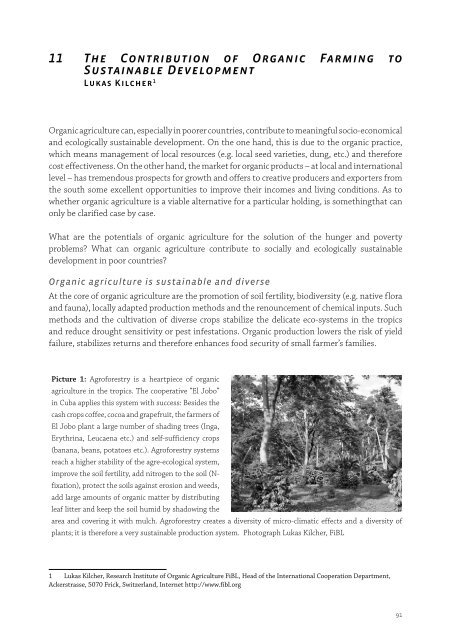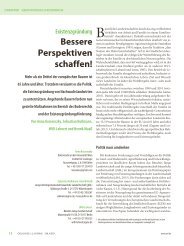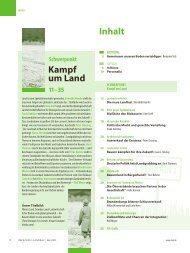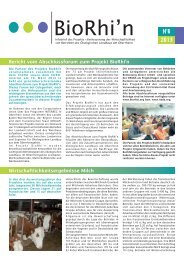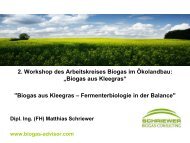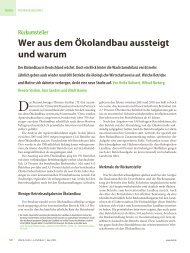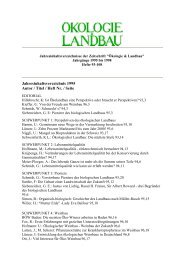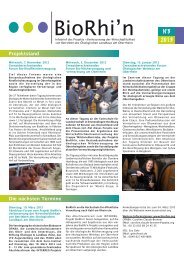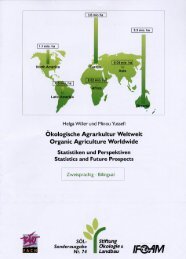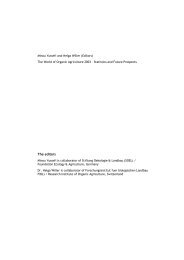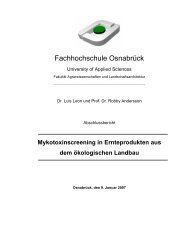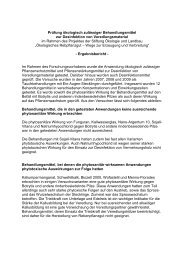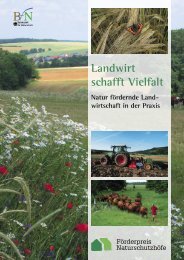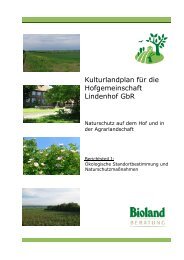the world of organic agriculture - Organic Eprints
the world of organic agriculture - Organic Eprints
the world of organic agriculture - Organic Eprints
Create successful ePaper yourself
Turn your PDF publications into a flip-book with our unique Google optimized e-Paper software.
11 The Contribution <strong>of</strong> <strong>Organic</strong> Farming to<br />
Sustainable Development<br />
Lukas Kilcher 1<br />
<strong>Organic</strong> <strong>agriculture</strong> can, especially in poorer countries, contribute to meaningful socio-economical<br />
and ecologically sustainable development. On <strong>the</strong> one hand, this is due to <strong>the</strong> <strong>organic</strong> practice,<br />
which means management <strong>of</strong> local resources (e.g. local seed varieties, dung, etc.) and <strong>the</strong>refore<br />
cost effectiveness. On <strong>the</strong> o<strong>the</strong>r hand, <strong>the</strong> market for <strong>organic</strong> products – at local and international<br />
level – has tremendous prospects for growth and <strong>of</strong>fers to creative producers and exporters from<br />
<strong>the</strong> south some excellent opportunities to improve <strong>the</strong>ir incomes and living conditions. As to<br />
whe<strong>the</strong>r <strong>organic</strong> <strong>agriculture</strong> is a viable alternative for a particular holding, is somethingthat can<br />
only be clarified case by case.<br />
What are <strong>the</strong> potentials <strong>of</strong> <strong>organic</strong> <strong>agriculture</strong> for <strong>the</strong> solution <strong>of</strong> <strong>the</strong> hunger and poverty<br />
problems? What can <strong>organic</strong> <strong>agriculture</strong> contribute to socially and ecologically sustainable<br />
development in poor countries?<br />
<strong>Organic</strong> <strong>agriculture</strong> is sustainable and diverse<br />
At <strong>the</strong> core <strong>of</strong> <strong>organic</strong> <strong>agriculture</strong> are <strong>the</strong> promotion <strong>of</strong> soil fertility, biodiversity (e.g. native flora<br />
and fauna), locally adapted production methods and <strong>the</strong> renouncement <strong>of</strong> chemical inputs. Such<br />
methods and <strong>the</strong> cultivation <strong>of</strong> diverse crops stabilize <strong>the</strong> delicate eco-systems in <strong>the</strong> tropics<br />
and reduce drought sensitivity or pest infestations. <strong>Organic</strong> production lowers <strong>the</strong> risk <strong>of</strong> yield<br />
failure, stabilizes returns and <strong>the</strong>refore enhances food security <strong>of</strong> small farmer’s families.<br />
Picture 1: Agr<strong>of</strong>orestry is a heartpiece <strong>of</strong> <strong>organic</strong><br />
<strong>agriculture</strong> in <strong>the</strong> tropics. The cooperative “El Jobo”<br />
in Cuba applies this system with success: Besides <strong>the</strong><br />
cash crops c<strong>of</strong>fee, cocoa and grapefruit, <strong>the</strong> farmers <strong>of</strong><br />
El Jobo plant a large number <strong>of</strong> shading trees (Inga,<br />
Erythrina, Leucaena etc.) and self-sufficiency crops<br />
(banana, beans, potatoes etc.). Agr<strong>of</strong>orestry systems<br />
reach a higher stability <strong>of</strong> <strong>the</strong> agre-ecological system,<br />
improve <strong>the</strong> soil fertility, add nitrogen to <strong>the</strong> soil (Nfixation),<br />
protect <strong>the</strong> soils against erosion and weeds,<br />
add large amounts <strong>of</strong> <strong>organic</strong> matter by distributing<br />
leaf litter and keep <strong>the</strong> soil humid by shadowing <strong>the</strong><br />
area and covering it with mulch. Agr<strong>of</strong>orestry creates a diversity <strong>of</strong> micro-climatic effects and a diversity <strong>of</strong><br />
plants; it is <strong>the</strong>refore a very sustainable production system. Photograph Lukas Kilcher, FiBL<br />
1 Lukas Kilcher, Research Institute <strong>of</strong> <strong>Organic</strong> Agriculture FiBL, Head <strong>of</strong> <strong>the</strong> International Cooperation Department,<br />
Ackerstrasse, 5070 Frick, Switzerland, Internet http://www.fibl.org<br />
91


